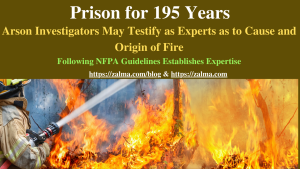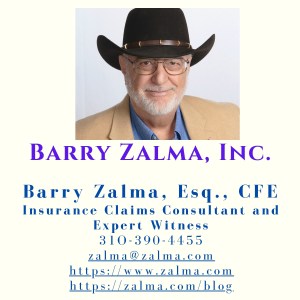Prison for 195 Years

See the full video at https://rumble.com/v2mvs5q-prison-for-195-years.html and at https://youtu.be/2Zp1PJ36HZc
Following NFPA Guidelines Establishes Expertise
Defendant, Todd N. Perkins, appealed twenty-eight criminal convictions stemming from a jury’s verdict finding that he intentionally caused a building explosion. He challenged the trial court’s denial of a hearing to determine the reliability of the bases for the arson investigators’ opinions. In The People of the State of Colorado v. Todd N. Perkins, No. 20CA0882, 2023 COA 38, Court of Appeals of Colorado, Division A (May 4, 2023) the Court of Appeals dealt with claims of incompetent fire cause experts.
BACKGROUND
The prosecution’s evidence at trial established the following pertinent facts: In August 2018, a residential apartment building in Denver exploded and caught fire. Law enforcement personnel, including two fire investigators from the Denver Fire Department, responded to the scene and found Perkins, badly injured and burned, in the rubble of an apartment unit belonging to tenant Matthew Brady. A few months after the explosion, the police interviewed Perkins at the hospital. He admitted that he was in the basement of Brady’s apartment on the date of the explosion.
During their investigation, the police learned the following information:
In the months before the explosion, Perkins worked as a handyman for the building owner and had performed repairs in Brady’s apartment.
The building owner had recently fired Perkins.
Brady had not given Perkins permission to be inside his apartment on the day of the explosion.
After he was fired, Perkins had sent a series of strange and arguably threatening text messages to the building owner.
There was a natural gas smell in the building before the explosion.
There were no gas leaks outside the building on the date of the explosion.
Right before the explosion, Perkins was seen either on the roof of the building or in Brady’s backyard.
A certified K-9, trained to detect accelerants, identified multiple potential areas of accelerant in the basement. On the first floor of the apartment, the police found the gas stove turned on, and the thermostat set to “heat.” Subsequent testing confirmed that Perkins’s DNA was present on both the thermostat and the crescent wrench.
Based on their examination of the scene, the fire investigators concluded that the disconnected natural gas lines in the basement of Brady’s apartment created a combustible mix of natural gas and air that ignited and caused the explosion.
A jury convicted Perkins as noted and the court sentenced him to 195 years in the custody of the Department of Corrections.
HEARING
The prosecution endorsed Denver Fire Department investigators Don Patterson and Jonathan Riggenbach to testify as fact witnesses and as experts in fire investigation and origin and cause investigation. The fire investigators opined that the explosion originated in the basement of Brady’s apartment and that Perkins intentionally caused the explosion by disconnecting natural gas pipes and igniting the gas.
The court denied Perkins’s motion to refuse to allow expert testimony from the investigators. The standards set forth by the National Fire Protection Association (NFPA) in its NFPA 921, Guide for Fire and Explosion Investigations, are widely regarded as the gold standard for fire investigation techniques. The court found that the prosecution’s experts were either NFPA certified or otherwise complied with the NFPA standards for fire investigators.
APPLICABLE LAW
Perkins challenged the reliability of arson science. A failure to strictly follow the NFPA guidelines does not automatically make the methodology unreliable. It was not designed to encompass all the necessary components of a complete investigation or analysis of any one case nor intended as a comprehensive scientific or engineering text. Because every fire incident is unique, NFPA 921 recognizes that not all techniques will apply to a particular incident and that it is up to the investigator’s discretion “to apply the appropriate recommended procedures in this guide to a particular incident.”
The Court of Appeal concluded that the fire investigators methodology was reliable because they used NFPA 921 to guide their investigation even though they did not strictly adhere to every step in NFPA 921.
Since the fire investigators’ testimony reveals that their proffered conclusions were based on deductive reasoning, drawing from their personal observations at the scene of the explosion (i.e., the significant amount of physical evidence of the explosion), as well as their review of related investigative reports and other documentary materials – including NFPA 921.
Therefore, the trial court did not abuse its discretion by determining that it had sufficient information to make reliability findings.
CONCLUSION
The standards set by the NFPA and specifically NFPA 921, the Guide for Fire and Explosion Investigations, constitute a reliable basis for an expert’s opinion. Strict compliance with NFPA 921 is not required for an expert’s testimony to be admissible under CRE 702, and that deviations from NFPA 921 go to the weight of the expert’s opinion and not the opinion’s admissibility.
Arson is a violent crime. Arson investigation is, in part, a scientific exercise based upon collection of facts. The NFPA sets standards for fire cause investigation. The standards are not restrictions upon the work of the investigators. They are guidelines not carved in stone. The fire cause investigators followed NFPA 921 sufficiently to allow their testimony as an expert and the conviction was affirmed. The evidence presented at trial was overwhelming and could have been sufficient to convict Perkins and the expertise of the arson investigators were properly presented to help the jury reach a decision. Mr. Perkins should spend the rest of his natural life in Prison.
 (c) 2023 Barry Zalma & ClaimSchool, Inc.
(c) 2023 Barry Zalma & ClaimSchool, Inc.
Subscribe and receive videos limited to subscribers of Excellence in Claims Handling at locals.com https://zalmaoninsurance.locals.com/subscribe.
Consider subscribing to my publications at substack at https://barryzalma.substack.com/publish/post/107007808
Go to Newsbreak.com https://www.newsbreak.com/@c/1653419?s=01
Barry Zalma, Esq., CFE, is available at http://www.zalma.com and zalma@zalma.com
Follow me on LinkedIn: www.linkedin.com/comm/mynetwork/discovery-see-all?usecase=PEOPLE_FOLLOWS&followMember=barry-zalma-esq-cfe-a6b5257
Write to Mr. Zalma at zalma@zalma.com; http://www.zalma.com; http://zalma.com/blog; daily articles are published at https://zalma.substack.com. Go to the podcast Zalma On Insurance at https://podcasters.spotify.com/pod/show/barry-zalma/support; Follow Mr. Zalma on Twitter at https://twitter.com/bzalma; Go to Barry Zalma videos at Rumble.com at https://rumble.com/c/c-262921; Go to Barry Zalma on YouTube- https://www.youtube.com/channel/UCysiZklEtxZsSF9DfC0Expg; https://creators.newsbreak.com/home/content/post; Go to the Insurance Claims Library – https://zalma.com/blog/insurance-claims-library.
Like this:
Loading…
Related







